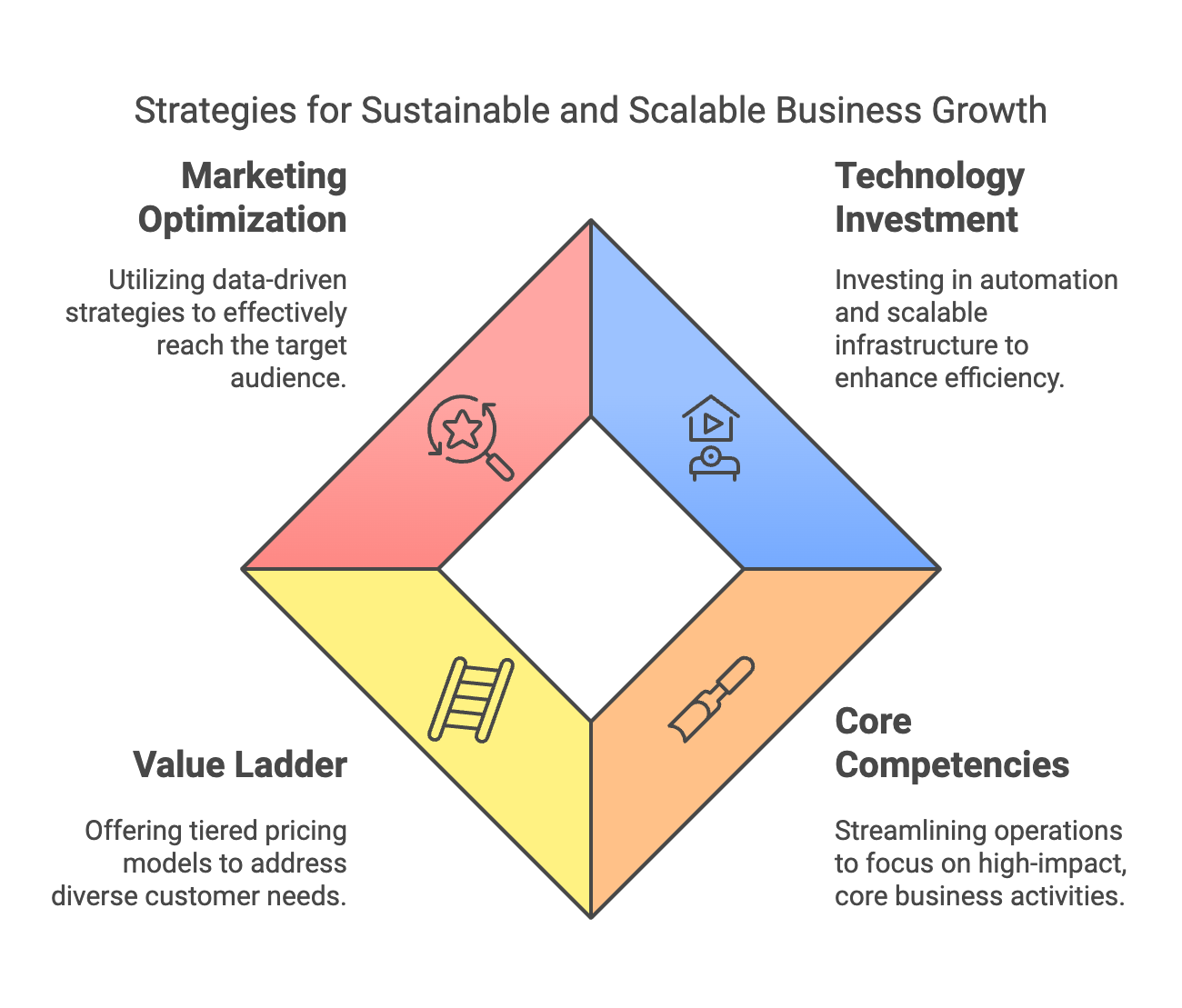
In today’s fast-paced business environment, understanding the nuances of business growth vs scaling is critical for entrepreneurs striving to expand their operations effectively. These two strategies often get conflated, but they represent distinct approaches to achieving business success. Recognizing the differences can help you align your strategy with your long-term goals and ensure sustainable progress.
In this article, we’ll break down what sets these two approaches apart, explore their unique challenges and benefits, and provide actionable insights to help you determine the right path for your business.
What is Business Growth?

Business growth refers to an increase in revenue, market share, or operational capacity that often comes with proportional increases in resources like staff, technology, and infrastructure. Growth is typically linear: for every input, such as hiring new employees or opening additional locations, there is a corresponding increase in output.
Characteristics of Business Growth:
- Resource-Driven: Growth requires significant investment in resources to achieve higher output.
- Linear Progression: Revenue increases proportionally with the addition of resources.
- Short-Term Focus: Businesses may prioritize immediate gains over long-term efficiency.
Example:
An advertising agency taking on five new clients will likely need to hire additional staff to manage the workload. While this increases revenue, it also raises operational costs.
What is Scaling?

Scaling, on the other hand, is the ability to increase revenue exponentially without a corresponding increase in resources. Scaling focuses on efficiency, leveraging automation, streamlined processes, and innovative strategies to achieve rapid growth with minimal additional costs.
Characteristics of Scaling:
- Efficiency-Focused: Scaling emphasizes maximizing output with minimal resource expansion.
- Exponential Growth: Revenue grows at a much faster rate than costs.
- Long-Term Strategy: Scalability ensures sustainable success and adaptability.
Example:
A digital coaching business automates client onboarding and course delivery, enabling them to serve more clients without significantly increasing operational costs. This allows the business to grow exponentially while maintaining efficiency.
Key Differences: Business Growth vs Scaling
Challenges of Business Growth in Scaling Strategies
While growth can feel like a natural progression, it comes with its own set of challenges:
- Resource Dependency: Increasing staff, facilities, and infrastructure demands higher capital.
- Operational Complexity: Managing larger teams and locations adds complexity to daily operations.
- Burnout Risks: Rapid growth without scalable systems can overwhelm employees and founders.
Business growth often requires careful planning to mitigate these challenges. For example, expanding too quickly without a clear understanding of operational limits can lead to inefficiencies and overstretched resources. Companies must also focus on maintaining employee well-being to avoid burnout, which can impact productivity and morale.
Growth also necessitates strategic hiring practices to ensure new employees align with company goals. The ability to manage resource allocation effectively becomes critical as a business scales its operations.
Challenges of Scaling: Insights into Business Growth vs Scaling
Scaling, while efficient, is not without hurdles:
- Process Optimization: Businesses need to invest time and resources in creating scalable systems.
- Quality Control: Maintaining product or service quality as demand increases can be difficult.
- Cultural Shift: Rapid scaling often requires significant adjustments in company culture and management practices.
Addressing these challenges involves building robust systems that can handle increased demand without sacrificing quality. Additionally, fostering a strong company culture during rapid growth ensures new team members align with core values, maintaining cohesion across the organization.
Scaling also demands forward-thinking leadership. Anticipating market changes, staying flexible, and leveraging technological advancements are crucial for sustainable success. These strategies help companies overcome common obstacles while setting the stage for exponential growth.
How to Choose Between Business Growth vs Scaling for Your Company

The decision to focus on growth or scaling depends on your business’s goals, resources, and market conditions. Here are some considerations:
Choose Growth If:
- You’re in the early stages of building your business.
- Your primary goal is to establish market presence.
- You have sufficient resources to manage linear expansion.
Choose Scaling If:
- Your product or service has achieved market fit.
- You’re ready to optimize systems for efficiency.
- You want to maximize profitability without overextending resources.
Actionable Tips for Scaling and Balancing Business Growth

- Leverage Technology: Invest in automation tools, CRM systems, and scalable infrastructure.
- Focus on Core Competencies: Streamline operations to prioritize high-impact activities.
- Build a Value Ladder: Offer tiered pricing models to cater to various customer segments.
- Optimize Marketing Efforts: Use data-driven strategies to target your ideal audience.
Case Study: Business Growth vs Scaling in a Coaching Business
A digital coaching business initially relied on manual processes for client onboarding and course delivery. By adopting a scalable model, they implemented automated email funnels, webinar systems, and a self-service platform for clients to access resources.
Results:
- Increased client base from 50 to 300 in one year.
- Revenue grew by 250%, while operational costs only increased by 15%.
- The founder spent less time on repetitive tasks and more time on high-value coaching sessions.
Key Takeaways:
- Automation allows businesses to scale without overwhelming staff.
- Focusing on client experience at scale ensures long-term retention and satisfaction.
Mastering Business Growth vs Scaling for Long-Term Success
Both business growth and scaling are essential strategies at different stages of a company’s lifecycle. Growth helps establish a foundation, while scaling ensures exponential success and efficiency. By understanding the unique aspects of each, entrepreneurs can make informed decisions to navigate their path toward sustainable success.
Whether your focus is on growing or scaling, aligning your strategies with your long-term vision is key to achieving meaningful and lasting results.
FAQs About Business Growth vs Scaling
- What is the difference between scaling and growth?
Growth involves proportional increases in resources and revenue, such as hiring more staff to handle additional clients. Scaling, however, is about achieving exponential revenue growth without significantly increasing costs or resources. - Is scale the same as grow?
No, scaling and growing are distinct. Growth often requires a proportional increase in resources, while scaling focuses on maximizing output with minimal additional input. - What are the four types of business growth?
The four types of business growth are:- Organic Growth: Increasing revenue through internal improvements like better marketing or new products.
- Strategic Growth: Expanding through partnerships or market positioning.
- Internal Growth: Optimizing existing processes and systems.
- External Growth: Acquiring or merging with other businesses.
- What does scaling mean in business?
Scaling refers to the ability to grow revenue at a faster rate than costs. It focuses on efficiency and the strategic use of existing resources to handle increased demand without overextending operations. - Why is scaling a business important?
Scaling is essential for long-term sustainability, as it allows businesses to meet increasing demand without sacrificing profitability or quality. - Can a small business scale successfully?
Yes, small businesses can scale by adopting efficient systems, leveraging technology, and focusing on high-impact strategies like automation and streamlined workflows. - How does company culture impact scaling?
Strong company culture ensures that new hires align with core values, maintaining cohesion and productivity even during rapid growth. - What industries benefit most from scaling?
Industries like digital marketing, SaaS, e-commerce, and online education benefit greatly from scaling due to their reliance on technology and low incremental costs. - What tools are essential for scaling a business?
Tools like CRM systems, automated marketing platforms, and project management software are critical for managing scalable operations efficiently.
